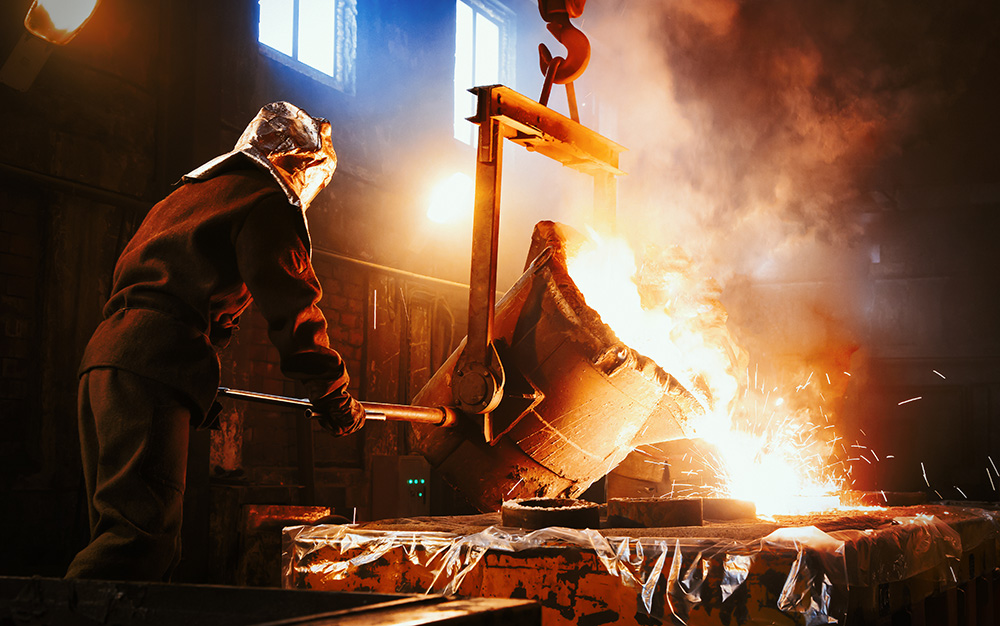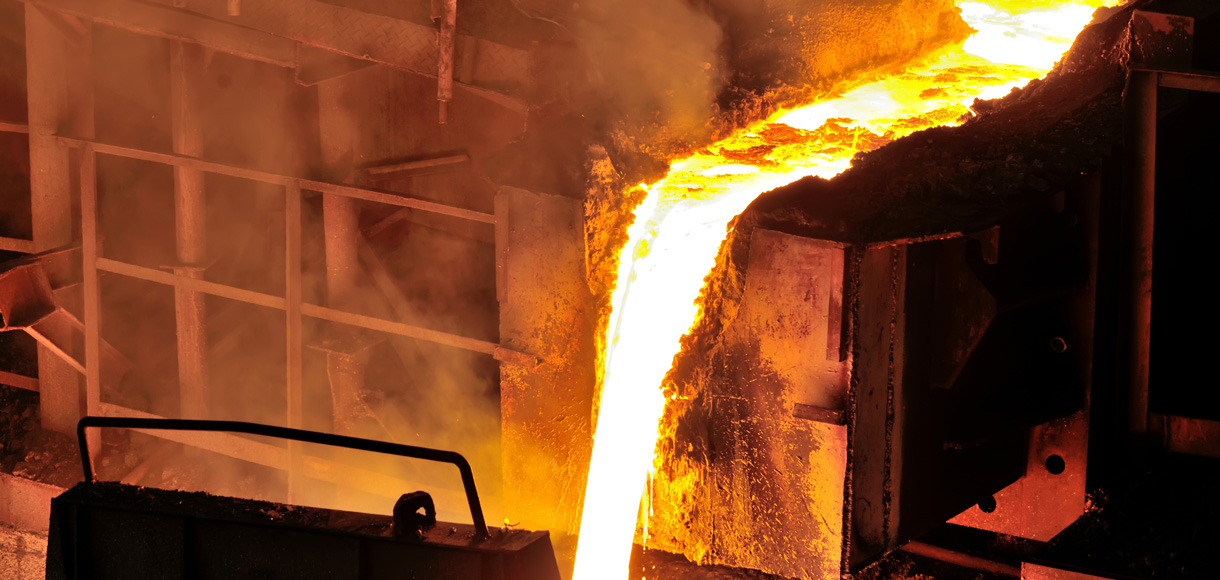Just How a Metal Foundry Adds To Sustainable Metal Production Practices
Metal foundries play a necessary duty in promoting sustainability within the metal production market. By including recycled materials, they decrease reliance on virgin sources and minimize environmental effects. Energy-efficient melting procedures better minimize power intake and discharges. However, the journey towards lasting techniques entails greater than simply reusing and energy management. It includes a broader dedication to moral sourcing and cutting-edge modern technologies. The ramifications of these methods are considerable and warrant better exam.
The Duty of Recycling in Metal Foundries
While metal manufacturing has actually commonly depended on virgin materials, the enhancing emphasis on sustainability has brought about a substantial change in techniques, specifically in metal foundries. Recycling has actually arised as a crucial part of this change, permitting foundries to repurpose scrap metal and reduce dependence on extracted resources. By integrating recycled materials right into their procedures, foundries not just reduce environmental impact yet additionally lower manufacturing prices.
Using recycled steels, such as copper, steel, and aluminum, reduces energy intake and minimizes greenhouse gas emissions related to typical mining and refining techniques. Foundries can accomplish top notch outcomes by using sophisticated sorting and handling technologies to assure the purity of recycled materials. This emphasis on reusing fosters a circular economic situation, where waste is minimized, and sources are utilized successfully. Metal foundries play a pivotal function in advertising sustainable methods within the metal manufacturing sector.
Energy-Efficient Melting Techniques
Energy-efficient melting techniques are essential for improving sustainability in metal manufacturing. These strategies substantially minimize energy consumption during the melting procedure, which is one of one of the most energy-intensive stages in metal manufacturing. Technologies such as induction melting, resistance heating, and microwave melting offer enhanced efficiency compared to conventional methods. Induction melting, for example, utilizes magnetic fields to generate heat straight within the metal, lessening energy loss and offering exact temperature control.
Furthermore, implementing heat healing systems can better boost efficiency by capturing and recycling waste warmth created during melting. Employing sophisticated insulation materials and enhancing heating system styles likewise add to energy savings. By adopting these innovative melting methods, metal foundries can reduce their carbon footprint, reduce functional prices, and add to a much more sustainable manufacturing landscape. The combination of energy-efficient methods not only aligns with environmental goals but also fulfills the expanding need for accountable production methods in the metal industry.
Lasting Sourcing of Raw Products
Sustainable sourcing of basic materials is vital for decreasing the ecological effect of metal production. This entails the increased application of recycled steels, the adoption of moral mining practices, and initiatives focused on regional sourcing. By prioritizing these strategies, the sector can advertise accountable resource management and support local economies.

Recycled Metal Use
Just how can industries properly reduce their environmental impact while fulfilling the growing demand for metal? One substantial approach is the utilization of recycled metal. By incorporating scrap metal right into their production processes, foundries can reduce the removal of virgin materials, thus decreasing and preserving natural resources power intake. Recycled steels need much less energy to procedure compared to their raw counterparts, resulting in lower greenhouse gas emissions. In addition, making use of recycled metal aids draw away waste from landfills, promoting a round economic climate. Industries that focus on recycled metal not only contribute to sustainability however likewise benefit from expense savings connected with lowered product procurement. Recycled metal application stands as a vital technique for environmentally liable metal production.
Ethical Mining Practices
While the need for steels remains to rise, markets are significantly acknowledging the relevance of ethical mining methods in guaranteeing responsible sourcing of basic materials. Honest mining includes a commitment to ecological stewardship, social obligation, and adherence to fair labor techniques. Companies are now focusing on partnerships with mines that show openness in their operations, decreasing ecological effect and respecting local areas. This strategy not just fosters a sustainable supply chain yet also boosts the credibility of organizations included. By carrying out rigorous standards and certifications, industries can deal with prohibited mining tasks and promote the well-being of employees. Inevitably, honest mining practices add considerably to a more lasting metal manufacturing community, straightening economic growth with ecological and social stability.
Local Sourcing Campaigns

Technologies in Metal Casting Processes
Technologies in metal casting processes are changing the industry by including advanced recycling strategies that decrease waste. Energy-efficient melting methods are additionally being developed to reduce power intake throughout manufacturing. Furthermore, the usage of innovative mold products adds to boosted efficiency and sustainability in casting operations.
Advanced Recycling Techniques
Advanced recycling methods are transforming metal casting procedures, significantly enhancing sustainability in the sector. These advancements concentrate on recovering and reprocessing scrap metal, considerably minimizing waste and the requirement for virgin materials. Techniques such as hydrometallurgy and pyrometallurgy enable foundries to draw out important metals from made use of components, guaranteeing efficient source use. In addition, advanced sorting and purification innovations enhance the quality of recycled metals, making them suitable for high-performance applications. This not just decreases the environmental footprint of metal manufacturing yet also fosters a round economic climate by advertising the reuse of materials. As these reusing techniques proceed to develop, they assure to better streamline operations within foundries and contribute to a much more lasting metal manufacturing landscape.
Energy-Efficient Melting Methods
While typical melting methods have long been the foundation of metal casting, current improvements have presented energy-efficient strategies that considerably reduce energy intake and exhausts. Technologies such as induction melting and electric arc furnaces have actually gained importance, enabling accurate control over temperature and reducing the need for nonrenewable fuel sources. These methods not just improve power performance however additionally advertise faster melting times, which translates to reduce operational costs. Additionally, developments in heat recuperation systems allow foundries to capture and reuse excess heat created throughout the melting process. This all natural approach to energy administration not only sustains sustainable methods however additionally placements metal foundries as leaders in the shift towards greener production procedures, better lining up with global sustainability objectives.
Ingenious Mold Materials
As the demand for more effective and lasting metal casting procedures expands, the expedition of cutting-edge mold and mildew products has actually come to be a centerpiece in the market. Conventional mold and mildew products often add to environmental obstacles, prompting the look for options that minimize waste and power usage. Recent advancements consist of the advancement of biodegradable binders and recyclable compounds, which not only enhance mold blog here efficiency yet likewise reduce eco-friendly influence. Additionally, the use of 3D printing innovation in mold and mildew development permits elaborate designs that lower material usage and allow fast prototyping. These ingenious products not just enhance casting accuracy but likewise straighten with sustainability objectives, showcasing the industry's dedication to lowering its carbon footprint while preserving top quality manufacturing criteria.
Minimizing Waste With Advanced Modern Technology
Cutting-edge technologies are changing the metal production industry by greatly decreasing waste and enhancing effectiveness. Advanced information analytics and device discovering algorithms make it possible for foundries to maximize manufacturing procedures, identifying inefficiencies and minimizing scrap material. Smart sensors monitor tools performance in real-time, permitting predictive maintenance that reduces downtime and waste generation. In addition, additive production techniques, such as 3D printing, allow for the development of complicated parts with very little material usage, noticeably lowering waste compared to standard methods.
Closed-loop systems are becoming extra prevalent, in which scrap metal and results are reused back into the production cycle, making sure that products are utilized to their greatest capacity. This combination of modern technology not only promotes resource conservation yet additionally boosts the general sustainability of metal production techniques. By embracing these developments, foundries can add to a much more lasting future while preserving competition out there
The Influence of Foundries on Carbon Impact Decrease
Foundries play an essential role in reducing the carbon footprint of the metal manufacturing market by implementing various sustainable methods. By using energy-efficient technologies, such as electrical arc heating systems, these centers considerably reduced greenhouse gas exhausts compared to standard approaches. Furthermore, foundries increasingly embrace renewable power resources, which likewise reduces their dependence on nonrenewable fuel sources.
Reusing scrap metal is an additional crucial method that foundries employ, preserving resources and decreasing the need for virgin materials. This not just reduces waste yet also lowers the energy-intensive removal procedures linked with mining. The adoption of closed-loop water systems assists to minimize water usage and reduce wastewater discharge, contributing to an extra sustainable operation.
With these initiatives, foundries demonstrate their commitment to ecological stewardship, leading to a marked decrease in the overall carbon impact of the metal manufacturing market. Their recurring efforts are critical in the change toward an extra sustainable commercial landscape.
Frequently Asked Concerns
What Types of Metals Are Most Commonly Recycled in Foundries?
Light weight aluminum, steel, brass, and copper are amongst the most generally recycled metals in foundries. These metals are favored as a result of their high his explanation recycling rates, economic value, and prevalent schedule, adding considerably to industrial sustainability initiatives.
Just How Do Foundries Ensure the Quality of Recycled Materials?
Foundries determine the high quality of recycled materials via rigorous screening, sorting, and purification procedures. They execute sophisticated technologies to examine composition and remove pollutants, guaranteeing that the recycled steels meet sector standards for performance and safety.
What Qualifications Exist for Lasting Foundry Practices?
Various accreditations exist for lasting foundry methods, consisting of ISO 14001 for ecological monitoring, ISO 50001 for power administration, and LEED certification for sustainable structure techniques (Aluminum Casting). These accreditations help assure adherence to ecological and sustainability requirements in operations
Exactly How Do Foundries Determine Their Carbon Footprint Reduction?
Foundries gauge carbon impact decrease with devices like lifecycle analyses, power audits, and exhausts tracking systems. They contrast standard discharges to present outputs, examining renovations in energy efficiency, product usage, and renewable resource adoption in time.
What Are the Economic Benefits of Sustainable Metal Manufacturing?
Sustainable metal manufacturing provides financial advantages such as minimized operational expenses, enhanced performance, boosted market competitiveness, and possible federal government motivations. Furthermore, it cultivates technology and draws in eco aware consumers, ultimately driving long-term profitability for organizations.
Metal foundries play an essential duty in advertising sustainability within the metal manufacturing market. While metal manufacturing has generally counted on virgin materials, the boosting emphasis on sustainability has actually led to a substantial change in methods, particularly in metal foundries. By incorporating scrap metal into their manufacturing processes, foundries can lower the extraction of virgin products, consequently preserving all-natural resources and lowering energy usage. Foundries play an important function in lowering the carbon footprint of the metal production industry by applying various lasting read here techniques. Recycling scrap metal is one more important method that foundries use, saving sources and reducing the requirement for virgin materials.